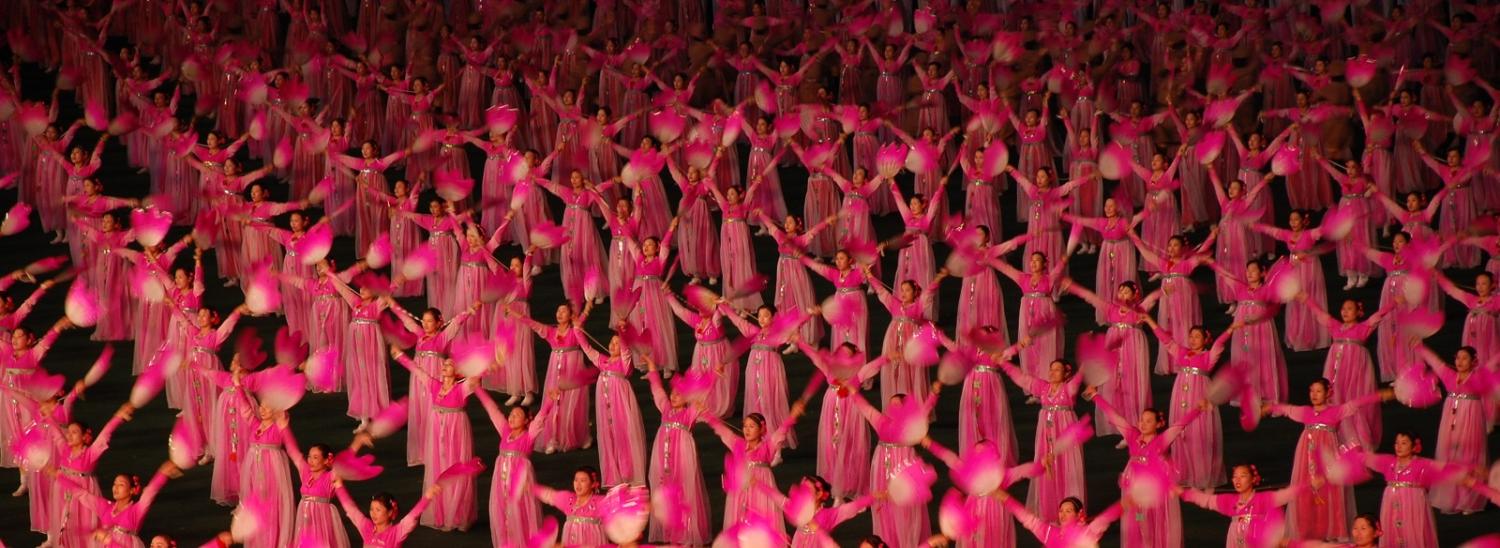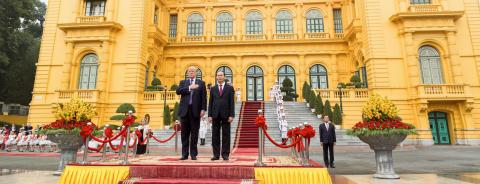Last week the Lowy Institute's International Security Program, supported by the Korea Foundation, hosted the Australia-Republic of Korea (ROK) Emerging Leaders International Security Forum in Sydney and Canberra, bringing together scholars and future policymakers focused on the bilateral security relationship. This is the sixth in a series of posts from Forum participants.
Recent history suggests an external shock won't lead to regime change in North Korea and, given the current political situation is not conducive to the rise of an ascendant class of political reformers, policy recommendations should focus on encouraging structural and behavioural change within the regime.
Some argue a crisis caused by an exogenous shock will create a split within the leadership and the state, in which case popular pressure might lead to the collapse of the regime. However, the North Korean regime has not only survived decades of economic difficulties, it appears to have become immune to both international sanctions and external shocks. Indeed, these appear to have strengthened cohesion amongst the elite. If the goal is internally-induced political change - as opposed to regime collapse - we need to take a long-term strategic approach to create conditions in which the process of transition may take place, either top-down or bottom-up.
There are two major approaches to political transition which offer an analytical framework for both the agent and process of change. The state-centred approach considers the behaviour and actions of the political elite groups and the political culture imposed upon the polity as the major determinant of the transitional process, whereas the society-centred approach regards modernisation, and mass political culture as important socio-economic and cultural preconditions of transformation. In other words, the primary actor in the process of political change can come from either the political elite or the society if - and only if - there is an organised group or a new ascendant class that can challenge the existing leadership’s confidence. Overthrowing, or even meaningfully destabilising the regime, through implosion within the ruling elite or a popular uprising is unlikely under current conditions. North Korea's distinctive brand of integration, legitimisation, and political management has effectively halted the emergence of agents of change or alternative visions for change.
North Korea's durable political system which is based upon a single, deeply entrenched political party under an absolute ruler and cohesive political elite as the centre of power. In such a configuration, the possibility of society-driven change is low. The regime has a highly centralised and relatively closed polity, and a society largely devoid of both civic culture and distinct social strata with particular social interests or established political-ideological views. The North Korean leadership features a strongly united power elite and a compact-sized ruling coalition. The long-term consolidation of a monolithic leadership, the eradication of factional division or opposition, and the formation of the established ruling coalition that supports a father-to-son leadership succession scheme have together created an ideologically-united elite. This group has prevented any legitimacy crisis or loss of confidence in its own domination. In the early years of Kim Jong Un leadership, a succession throughout the three generations in a relatively short time put the legitimacy issue in question. Recent studies, however, suggest that regime has restored a stable power structure and a cohesive ruling group that provides a strong support base for the leadership.
A lack of political change owes much to the distinctive features of the North Korea regime and behavioural characteristics. Firstly, monolithic leadership has prevented the formation of an alternative to Kim’s political power or possible conflicts within the leadership. The father-to-son leadership succession helped eradicate a possible power struggle surrounding the succession issue. Secondly, building a closed but controlled society curtailed growth of civil society or any possibility of a societal force emerging that could challenge the existing leadership. In the absence of potential agents of change or alternative vision, any significant change in the existing system is unlikely.
This regime deviates from the global trend of post-communist transition towards political pluralism, democracy, and fully-fledged markets. The present leadership has little to no intent to head down this path, as demonstrated in the 7th Party Congress in May 2016. That the old system continues is not due to the superior functioning of North Korea’s communist institutions or rigid adherence to the utopian goal of communism, but because of the lack of an alternative vision as to how to restructure the system without risking regime collapse. The mission, therefore, is not to find a prototype of institutional change that could be recommended for North Korea, but to accept the country-specific development process and offer acceptable alternatives that could induce change in the behavioural features of the North Korean regime.
The impetus for political change has to come from within. The outsiders' role should be limited to providing favourable conditions for the agents of change to grow and rise. Encouraging market-based reforms and opening-up of its closed society would offer a better solution for political change in the long-term. The North Korean regime largely remains insulated from outside influence, thus, little information is available to leaders that could challenge the ideology of the regime. Market-based reforms and opening-up may not only offer North Korea a vision for the reform of the existing system in the post-communist era, but also generate structural change that would allow for a more balanced state-society relationship and a rise of ascendant class or political reformers necessary conditions for political change. Therefore, the answer is engagement not containment.

